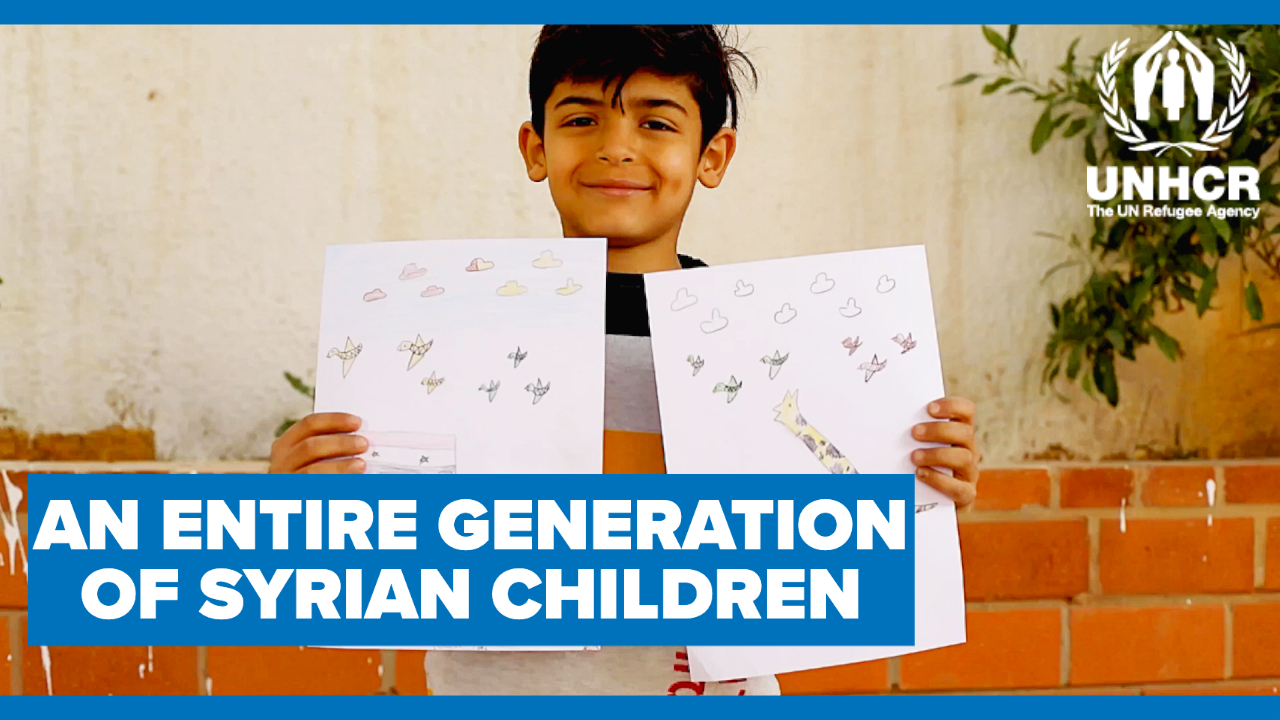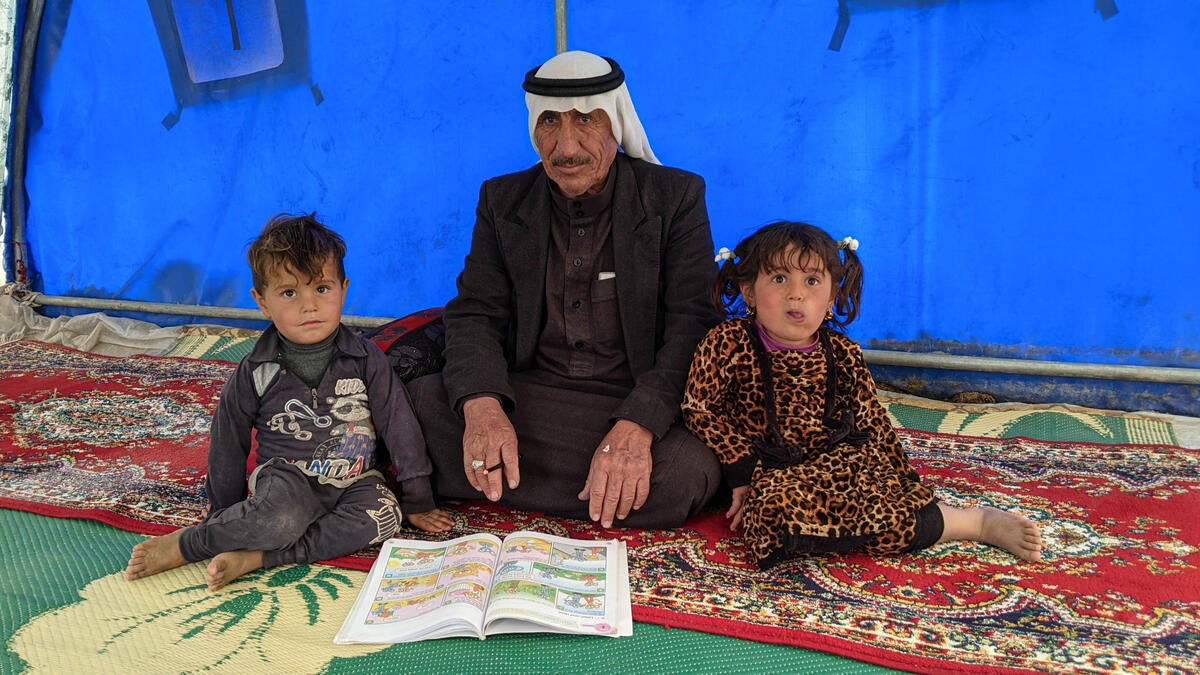UN Humanitarian Briefing on Iraq
UN Humanitarian Briefing on Iraq
UN High Commissioner for Refugees Ruud Lubbers today called on all governments neighbouring Iraq to keep their borders open to those in need of temporary protection and assistance. We rely on countries keeping borders open so refugees can seek temporary protection and assistance.
Iraq's neighbours have primary responsibility for providing refugees with temporary protection and material assistance to lessen the effects of human suffering, and for security, including maintaining the civilian and humanitarian character of any refugee-hosting areas. UNHCR is working to augment that reception capacity by helping governments to establish camps throughout the region.
There are no reports yet of refugees moving out of Iraq. UNHCR here in Amman is in contact with the Jordanian government regarding two Iraqis at the border - they are travelling alone and say that they want to proceed onwards to other countries. Third country nationals (TCNs) are the only significant groups we've seen arriving at Jordan's Al Karama border crossing. UNHCR has sent rations to the border for this group, and IOM is in contact with the authorities about arranging their onward transit.
In Jordan, UNHCR and the Jordanian Hashemite Charity Organization (JHCO) are preparing one camp site at Ruwaished, about 60 kilometres from the Iraqi border. We signed an agreement on Wednesday with Jordan's Ministry of Planning to provide $1 million for work being undertaken on the site. Ruwaished will be ready for 5,000 Iraqi refugees by next week. Preparations are ongoing so that, if necessary, Ruwaished could accommodate up to 10,000 people. Weather permitting, JHCO workers will start erecting tents today. Water is available, and a desalination plant to enhance the water quality at Ruwaished has been installed by the government. The NGO Japan Platform is establishing a health clinic at the site. Starting today, Oxfam will begin work on the camp's water distribution system. At the Al Karama border crossing point, east of Ruwaished, the Jordanian government is levelling a site for possible use as a transit area for refugee arrivals, and installing toilets. UNHCR has one staff member on duty at Al Karama monitoring the border.
We have sent supplies of tents, blankets, plastic tarpaulins, kitchen sets, mattresses, stoves, lanterns, and hygienic supplies for 10,000 people to a Jordanian Hashemite Charity Organization-managed warehouse in Ruwaished, where UNHCR has secured a satellite office. UNHCR staff are based out of our new satellite office in Ruwaished since earlier this week. Also at Ruwaished, the government of Jordan and the Jordanian Red Crescent are preparing a second site for possible third country nationals, should any foreign workers leave Jordan.
In Syria, El Hol camp, about 100 km from the Iraqi border, has an initial capacity for 4,000 to 5,000 people. The site will soon be ready to shelter up to 10,000 once sanitation works are completed; supplies for this number have already been pre-positioned. Additional supplies are available at our regional warehouses in Jordan and Turkey should larger numbers arrive. UNHCR staff leaving Iraq on Tuesday saw a number of 4WD [4-wheel drive] cars heading towards Iraq's frontier with Syria, and there have been reports lately of a number of Iraqis renting apartments in Damascus. In recent weeks we've seen no change in the number of Iraqi asylum seekers in Syria, nor elsewhere in the region.
UNHCR today released $1 million to Iran's Bureau for Aliens and Foreign Immigrant Affairs (BAFIA) to help finance works at the four sites currently under preparation for the possible arrival of 15,000 refugees each. Site preparation is currently on going at one site each in Khermanshah and Ilam provinces and two sites in Khuzistan Province near Ahwaz for a total initial capacity of up to 60,000.
UNHCR has four mobile teams in Turkey. So far, we have not seen any refugees crossing the border from Iraq. According to various reports, there have been some population movements from cities and towns in the north of Iraq, but no pressure on the border and it seems that some people have basically moved into the countryside. We're not able to gauge the scale of this displacement, but some reports speak of movements from towns in the range of 80,000 people.
Throughout the region, UNHCR's contingency planning for refugee movements is based on an initial preparedness figure for 600,000 Iraqi refugees. This is not a "prediction," but a working figure based on one of many possible scenarios. It allows us to plan our budgets, logistical requirements and staffing needs. The working figure is not set in stone and can be adjusted as events dictate. And we know all too well from past experience that these working figures can be substantially different than the eventual reality.
The initial contingency preparations by UNHCR for 600,000 people require $60 million to purchase the necessary supplies and to operate camps for one month. We expect to launch a further appeal covering a six month period later in March. This initial $60 million budget is part of the $123 million in requirements already announced by the United Nations in New York on Feb. 13 to cover the initial joint preparedness efforts of nine U.N. humanitarian agencies and IOM.
Of the $60 million sought by UNHCR, we have received $21 million. The United Kingdom this week contributed $2.7 million, while Australia and Norway said they would repay $1.8 million out of a $6 million loan UNHCR took from the UN Central Emergency Relief Fund.
Drawing on contributions to date and our limited existing reserves, UNHCR has spent $28 million on procurement, transportation and storage of non-food relief items, and on other preparedness measures in the region. As of yesterday, we had pre-positioned emergency stocks for nearly 300,000 people in the region and we should have enough in place for 350,000 in the next fortnight. Supplies (tents, blankets, plastic tarpaulins, mattresses, stoves, lanterns, kitchen sets, etc.) continue to arrive and are being pre-positioned around the region, including Iskenderun, Turkey, Kermanshah, Iran, and Aqaba, Jordan. We are also assembling information from a wide range of other partners in the region who have their own emergency stocks in place.
In recent weeks, we have deployed about 30 additional international staff to countries surrounding Iraq. They join the more than 200 national and international staff already working in our 15 offices across the region. We also have on standby seven emergency response teams - each with about 15 or 20 members - who can be deployed within 72 hours. These teams are composed of specialists in emergency work and cover a range of protection, assistance and technical needs.
UNHCR is working in close partnership with the neighbouring states to protect and assist refugees, including through their national Red Crescent Societies in conjunction with the IFRC and ICRC. The region's Red Crescent societies have good domestic networks and operational capacity, which make them a good fit with UNHCR's international protection and advocacy responsibilities. This is why UNHCR is now working with them and other partners to assemble information on our combined emergency stocks in the region.
In the event of refugee flows, UNHCR would focus primarily on its mandated international protection and advocacy role, including monitoring in support of keeping borders open and ensuring that the rights of refugees are respected - entailing UNHCR's access to all refugee populations. UNHCR will deploy its own specialist staff to provide proper technical expertise and support for national efforts to protect and assist refugees within and along their borders. This could include any asylum seekers caught along Iraq's borders with neighbouring states.
UNHCR will focus on upholding basic refugee protection principles, particularly the principle of non-refoulement and access to asylum. Together with the host governments, UNHCR staff would conduct registration of refugees. UNHCR will also seek the continued protection of some 100,000 refugees already living in Iraq.
Materially - and depending on available resources - UNHCR will support governments in providing essential services, including food, basic shelter, water, sanitation facilities, health care and clothing. To the extent possible, UNHCR will supplement the material aid provided by the host governments, their national Red Crescent societies, NGOs and other humanitarian organizations.








